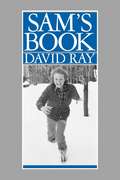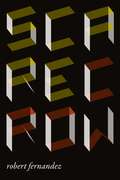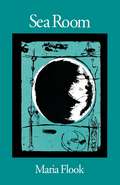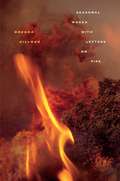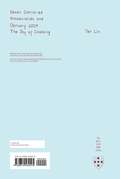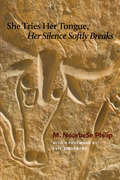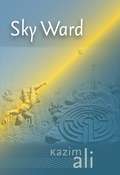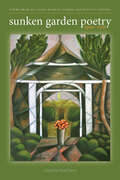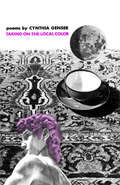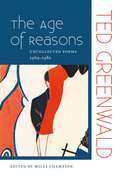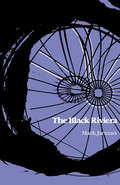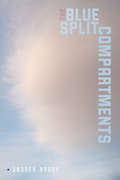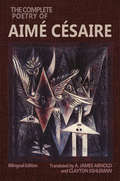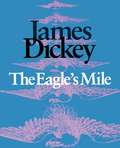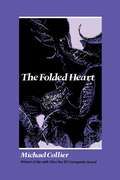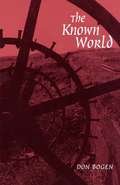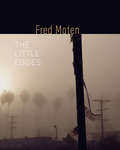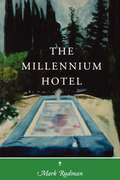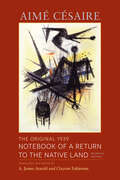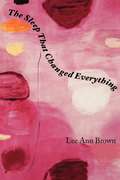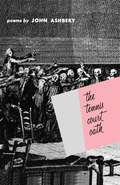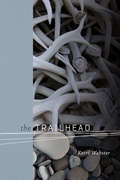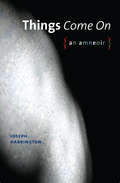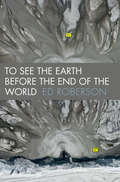- Table View
- List View
Sam's Book (Wesleyan Poetry Series)
by David RayWhen Sam Ray was killed at nineteen in an accident, his father began writing poetry dedicated to his memory. Sam's Book is a collection of these elegies and other poems written during Sam's lifetime. "How should I mourn?" David Ray asks. By recalling poignant events from the past he transcends his grief. He remembers Sam's first bath, a "holy/Rite"; tying the shoelaces of the "little man"; traveling to Greece, where Sam is "the first.../to see the holy moon." With painful wit and regret he summons up the image of his son's blue Toyota, fastidiously transformed by Sam and his girlfriend into a "love nest." Ray muses on what he taught Sam and what Sam taught him. Originally published in 1987, Sam's Book won the 1988 Maurice English Poetry Award.
Scarecrow (Wesleyan Poetry Ser.)
by Robert FernandezTaking Dante and other catalogers of failure and ruin (Baudelaire, Trakl, Rimbaud) as its guiding lights, Scarecrow charts situations of extremity and madness: "Are you / insistent? Are you dead? / Are you guilty? Has your / name been lifted, a vein / of earth from earth?" It also charts the insistence of time's passing and with it the awakening to both new and foreclosed possibilities. What will remain for us after the disaster? How will we rebuild? To whom will we address ourselves and with what voice? Also a love poem, one of desire and hope, Scarecrow aligns a tragic sensibility with a faith in the other and in the redemptive power of forgiveness. Within the beauty and strangeness of this work rests an imperative that captures the directive of poetry at its best: "Present yourself / in the full radiance of captivation." In its mystery and defiance, Robert Fernandez's collection does precisely this. An online reader's companion will be available at robertfernandezsite.wesleyan.edu.
Sea Room (Wesleyan Poetry Series)
by Maria FlookSea Room is a navigational term meaning adequate space at sea in which to maneuver a ship. The term seems an incongruity - that something so open and deep should require such precise and careful charting. In these most specific and powerful poems, the poet maps areas of obsessive love, phobic illness, godlessness, the prism of sexuality and romantic instinct in which all things are reflected, distorted.There's a playful terror in Maria Flook's poems. Her animated word is full of signs and signals; she always finds the telling analogue or makes the figure which reveals, illuminated everyday perceptions. "Dreams have cruel motives. Sleep worries/ both the decent and the wicked/ who keep odd hours/ so I walked out."The poems search for reprieve, or a calm, in wronged lives. Any accusations are fully explored, recalled in forgiveness or apology for relationships long over.
Seasonal Works with Letters on Fire (Wesleyan Poetry Series)
by Brenda HillmanFire? its physical, symbolic, political, and spiritual forms?is the fourth and final subject in Brenda Hillman's masterful series on the elements. Her previous volumes?Cascadia, Pieces of Air in the Epic, Practical Water?have addressed earth, air, and water. Here, Hillman evokes fire as metaphor and as event to chart subtle changes of seasons during financial breakdown, environmental crisis, and street movements for social justice; she gathers factual data, earthly rhythms, chants to the dead, journal entries, and lyric fragments in the service of a radical animism. In the polyphony of Seasonal Works with Letters on Fire, the poet fuses the visionary, the political, and the personal to summon music and fire at once, calling the reader to be alive to the senses and to re-imagine a common life. This is major work by one of our most important writers. Check for the online reader's companion at brendahillman.site.wesleyan.edu.
Seven Controlled Vocabularies and Obituary 2004. The Joy of Cooking: [AIRPORT NOVEL MUSICAL POEM PAINTING FILM PHOTO HALLUCINATION LANDSCAPE] (Wesleyan Poetry Series)
by Tan LinHow do we read a book as an object in a network, in a post-book, post-reading, meta-data environment? Seven Controlled Vocabularies models a generic book, a kind of field guide to the arts, wherein distinctions between various aesthetic disciplines are relaxed or dissolved and where avant-garde notions of difficulty are replaced with more relaxing and ambient formats such as yoga, disco, and meditation. Each of the book's seven sections is devoted to a particular art form--film, photography, painting, the novel, architecture, music, and theory--and includes both text and found photographs as it explores the idea of what it means to be a book in an era when reading is disappearing into a diverse array of cultural products, media formats, and aesthetic practices. Seven Controlled Vocabularies will be available in a variety of print and electronic book delivery systems and formats.
She Tries Her Tongue, Her Silence Softly Breaks (Wesleyan Poetry Series)
by M. NourbeSe PhilipBrilliant, lyrical, and passionate, this collection from the acclaimed poet M. NourbeSe Philip is an extended jazz riff running along the themes of language, racism, colonialism, and exile. In this groundbreaking collection, Philip defiantly challenges and resoundingly overthrows the silencing of black women through appropriation of language, offering no less than superb poetry resonant with beauty and strength. She Tries Her Tongue, Her Silence Softly Breaks was originally published in 1989 and won the Casa de Las Americas Prize. This new Wesleyan edition includes a foreword by Evie Shockley. An online reader’s companion will be available at http://nourbesephilip.site.wesleyan.edu.
Sky Ward (Wesleyan Poetry Series)
by Kazim AliDrunk on the sun and the sea, Kazim Ali's new poems swoop linguistically but ground themselves vividly in the daily and real. Both imprisoned by endlessness and dependent on it for nurturing and care, in Sky Ward Ali goes further than ever before in sounding out the spaces between music and silence, between sky and ocean, between human and eternal. "Daily I wish stitched here to live," moans his Prometheus, wondering what release from familiar bondage might actually portend. "So long liberation," his Icarus sings as he plummets from the sky with desperation and grace, ready to unfeather and plunge into the everything-new. Whether in the extended poem-prayer to Alice Coltrane or in the "deleted scenes" and "alternate endings" to his critically acclaimed volume Bright Felon, or in the spirit-infused and multi-faceted lyrics he has become known for, Ali once again reinvents possibilities for the personal lyric and narrative.
Sunken Garden Poetry
by Lary Bloom Brad Davis Rennie McquilkinSince 1992, the Sunken Garden Poetry Festival has welcomed nationally acclaimed poets to the picturesque landscape of Hill-Stead Museum, a National Historic Landmark in Farmington, Connecticut. Reflecting the festival that has attracted thousands to this rolling country estate, the poems in this collection have been selected with a broad audience in mind. In the spirit of the festival's mission to nurture the art of poetry, the anthology features young and emerging poets alongside established poets, including Lucille Clifton, Billy Collins, Carolyn Forche, Yusef Komunyakaa, Maxine Kumin, James Merrill, Marilyn Nelson, Grace Paley, and Richard Wilbur. This new anthology captures the exciting and unique relationship between a distinctive American museum and poetic expression. In addition to a rich selection of poetry, the book includes both an illustrated introduction providing a history of the festival and an appendix listing all festival dates, poets, and musicians for each year."The Sunken Garden Poetry Festival is a little paradise for poetry." - Galway KinnellEbook Edition Note: Ebook edition note: The poem "The Skeptics," by Gary Soto, has been redacted.
Taking on the Local Color: Poems (Wesleyan Poetry Program)
by Cynthia GenserCynthia Genser's landscapes, like those of D.H. Lawrence, are analogues of human emotions; her men and women exist in their effects-prototypes one minute, passionate and distinctly visible individuals the next. Person and place invite the reader into an adventure that begins and ends everywhere.The language employed throughout is voluptuous, sensuous, yet precise. The appeal is to all the senses as well as to reason and intelligence: the poems, seamed with a difficult, sweaty beauty, stimulate every pleasure center. But pure language play also leads to hard, intelligent sense.Of her own work, Cynthia Genser has said, "Although I belong to no special school or group, I align my poetry with the work of others aiming their metaphors at the banality and reductionism of our world-at the terror or planned obsolescence, Vogue Magazine, the threat of nuclear warfare. I cannot agree more with the Marxist Henri Lefebvre that poetry is the enemy and eventual victor in the war against 'terrorism' and the terrorist society we now live in."
The Age of Reasons: Uncollected Poems 1969–1982
by Ted GreenwaldThis collection of Ted Greenwald's poetry, edited by Miles Champion, is a sampler of some of Greenwald's most breathtaking work. A New York poet with close ties to the New York School and the Language poets, Greenwald has written daily since the early 1960s, and none of the poems in this book are included in any of his books to date. These discrete works were written in advance of or alongside the extended explorations of a mutated triolet form that increasingly occupied him from the late 1970s on. This book can be seen as a companion to Common Sense, and provides further evidence of Greenwald's ability to think with his ear, to hear what's said as it arrives as a fresh sound or shape in his head. This work is singular in its pattern-making, its music-making, and its ability to simultaneously follow multiple paths. An online reader's companion will be available at tedgreenwald.site.wesleyan.edu
The Bad Wife Handbook (Wesleyan Poetry Series)
by Rachel ZuckerRachel Zucker's third book of poems is a darkly comic collection that looks unsparingly at the difficulties and compromises of married life. Formally innovative and blazingly direct, The Bad Wife Handbook cross-examines marriage, motherhood, monogamy, and writing itself. Rachel Zucker's upending of grammatical and syntactic expectations lends these poems an urgent richness and aesthetic complexity that mirrors the puzzles of real life. Candid, subversive, and genuinely moving, The Bad Wife Handbook is an important portrait of contemporary marriage and the writing life, of emotional connection and disconnection, of togetherness and aloneness.
The Black Riviera (Wesleyan Poetry Series)
by Mark JarmanYet, these are ultimately poems of survival. Jarman explores the redemptive power of the imagination and the ways in which we transform experience into stories we tell about our lives. His characters vividly express the will to cling to existence and understand it as they pursue the meaning of family, home, identity, and love. Invented memories resurrect a forgotten past, opening doors of possibility and adding a strange richness to everyday life. "Flowers of the flesh,/ Hung on the cliffs to watch and be watched./ Don't let me see reproach, don't let me see it,/ In your eyes. Let me be the only one/ Who knows and tells you."
The Blue Split Compartments (Wesleyan Poetry Series)
by Andrea BradyThe Blue Split Compartments is a complex and powerful sequence of lyric poems exploring how the physically intimate relationships between military drone operators and their victims are mediated, not only through the technological interfaces of the screen and drone, but also through language and subjectivity. Drawing on chatroom logs, military policy manuals, pattern of life archives, and accounts by witnesses around the world, these poems document the consequences of the perpetual and 'everywhere war' conducted from remote airbases, where pilots in shipping containers surveil and destroy remote 'objects'. Brady's approach offers a sophisticated interplay of diction, rhetoric, syntax, positioning, allusion, and sonic quality that generates legible currents of meaning and orientation. Entire countries have been turned into 'open air prisons', where the buzzing of drones overhead induces profound trauma and changes to social life. These poems strafe a documentary history of drone warfare with personal memory, and reflections on the myths and mechanics of prosthetic violence, voyeurism, masculinity, and desire. The Blue Split Compartments is a bitter comedy in drone erotics, a devastating reach into the twisted soul of murderous techno-surveillance regimes, a linguistically virtuosic and deeply humane x-ray of the discursive and militaristic systems that join us in mutual dissolution.
The Complete Poetry of Aimé Césaire: Bilingual Edition
by Clayton Eshleman Aimé Césaire A. James ArnoldThe Complete Poetry of Aimé Césaire gathers all of Cesaire’s celebrated verse into one bilingual edition. The French portion is comprised of newly established first editions of Césaire’s poetic œuvre made available in French in 2014 under the title Poésie, Théâtre, Essais et Discours, edited by A. J. Arnold and an international team of specialists. To prepare the English translations, the translators started afresh from this French edition. Included here are translations of first editions of the poet’s early work, prior to political interventions in the texts after 1955, revealing a new understanding of Cesaire’s aesthetic and political trajectory. A truly comprehensive picture of Cesaire’s poetry and poetics is made possible thanks to a thorough set of notes covering variants, historical and cultural references, and recurring figures and structures, a scholarly introduction and a glossary. This book provides a new cornerstone for readers and scholars in 20th century poetry, African diasporic literature, and postcolonial studies.
The Eagle's Mile (Wesleyan Poetry Series)
by James DickeyA book of new poems by a major writer is an event. A book of new poems that marks a different, more powerful approach is cause for celebration. "What I looked for here," James Dickey tells us about The Eagle's Mile, "was a flicker of light 'from another direction,' and when I caught it - or thought I did - I followed where it went, for better or worse." In this new work, Dickey edges away from the narrative-based poems of his previous books and gives instead more primacy to the language in which he writes. His poetry gains flexibility, and his poetic power becomes even surer and more clearly expressed. "I have experimented," Dickey writes, "and look forward to experimenting more."
The Folded Heart (Wesleyan Poetry Series)
by Michael CollierIn his second book, Collier ( The Clasp ) applies a characteristically light touch to profundities: traveling through memory, from conscious to unconscious knowledge, or in physical space that soon acquires figurative dimension, the poet plumbs personal matters of fact that effortlessly outgrow the personal. His narrators seek out the transfiguring moment. In "Spider Tumor," one of the strongest poems, a visit to a childhood friend brings a luminously clarifying encounter with death and the understanding that this meeting is only one of many the future holds for the narrator, while in "The Lights," a boy notices the way ivy "feet" have left tracks on a brick wall in "a pattern radiating / like a corner of a galaxy." Looking but not straining for inherent "patterns" in his subjects, Collier writes with selfless grace about experience; his personas are elegantly unassuming. In his work, "the earth's / powdery talc obscures our keen desires with time," but a reckoning with those desires is still necessary, even if in conclusion one finds "twenty years have passed and I feel / the absence of something / I never held."
The Known World (Wesleyan Poetry Series)
by Don BogenTurning bare description into a luxuriance, The Known World looks at the complex relationship of past and present, creating energetic juxtaposition between different historic periods to envision life at the end of our own century. Don Bogen calls the work an archeology, and uses details f life in past eras as a way of penetrating the surfaces of history. In his account, everything known is both encumbered with and defined by the past. Short poems in this collection cohere around the long title poem, which explores the nineteenth century through more than thirty sections in different voices and styles, including lists, mock letters, brief narratives, and lyric passages. The result is lively and illuminating.
The Little Edges (Wesleyan Poetry Series)
by Fred MotenThe Little Edges is a collection of poems that extends poet Fred Moten's experiments in what he calls "shaped prose"--a way of arranging prose in rhythmic blocks, or sometimes shards, in the interest of audio-visual patterning. Shaped prose is a form that works the "little edges" of lyric and discourse, and radiates out into the space between them. As occasional pieces, many of the poems in the book are the result of a request or commission to comment upon a work of art, or to memorialize a particular moment or person. In Moten's poems, the matter and energy of a singular event or person are transformed by their entrance into the social space that they, in turn, transform. An online reader's companion is available at http://fredmoten.site.wesleyan.edu.
The Millennium Hotel: The Rider Quintet, vol. 2 (Wesleyan Poetry Series)
by Mark RudmanIn this captivating sequel to his award-winning Rider, Mark Rudman reclaims a sacred space for poetry. The Millennium Hotel is a world of dazzling imitations, a vast casino where personal narrative is recognized as a fiction and death always holds the winning hand. Rudman asks, "How not to be seduced by the new?" as he illustrates the intimate ways in which facade, gender, and memory inform both our private and public realms.Here the interlocutor's voice shifts and freely crosses gender lines, especially in poems about early erotic experience. Mothers, daughters, lovers, and wives are passionately engaged. Its inclusiveness and wide range of tonal registers enable The Millennium Hotel to blend seamlessly the intimate, the social, the comic, and the apocalyptic. The book moves like a series of sonatas, melding childhood, the diaspora, and eros.
The Original 1939 Notebook of a Return to the Native Land: Bilingual Edition (Wesleyan Poetry Series)
by Clayton Eshleman James Arnold Aime CesaireAime Cesaire's masterpiece, Notebook of a Return to the Native Land, is a work of immense cultural significance and beauty. This long poem was the beginning of Cesaire's quest for negritude, and it became an anthem of Blacks around the world. Commentary on Cesaire's work has often focused on its Cold War and anti-colonialist rhetoric material that Cesaire only added in 1956. The original 1939 version of the poem, given here in French, and in its first English translation, reveals a work that is both spiritual and cultural in structure, tone, and thrust. This Wesleyan edition includes the original illustrations by Wifredo Lam, and an introduction, notes, and chronology by A. James Arnold.
The Sleep That Changed Everything (Wesleyan Poetry Series)
by Lee Ann BrownOffering both subtle and immediate pleasures, Lee Ann Brown's generous new book extends her unmistakable, original voice, every bit as Southern as it is avant-garde, gracious without being naive. Abounding in a playfulness of style, including songs and ballads, the poems in The Sleep That Changed Everything are by turns funny, serious, insightful and moving. Botanical and scientific language are used here as collage elements to chart cycles of desire and emotional transformation. Brown is committed to Whitman's idea that we all have many selves; thus her work embraces the immediacy of the New York School, the personal and literary wildness of the Beats, the word play and political astuteness of Language poetry and an eroticism all her own. In poems that are both highly literate and plain-spoken, Brown makes the life of the soul directly available in all its renegade garb.
The Tennis Court Oath: A Book of Poems (Wesleyan Poetry Program)
by John AshberyJohn Ashbery writes like no one else among contemporary American poets. In the construction of his intricate patterns, he uses words much as the contemporary painter uses form and color- words painstakingly chosen as conveyors of precise meaning, not as representations of sound. These linked in unexpected juxtapositions, at first glance unrelated and even anarchic, in the end create by their clashing interplay a structure of dazzling brilliance and strong emotional impact. From this preoccupation arises a poetry that passes beyond conventional limits into a highly individual realm of effectiveness, one that may be roughly likened to the visual world of Surrealist painting. Some will find Mr. Ashbery's work difficult, even forbidding; but those who are sensitive to new directions in ideas and the arts will discover here much to quicken and delight them.A 35th anniversary edition of classic work from a celebrated American poet who has received the Pulitzer Prize, the national Book Award, and the national Book Critics Circle Award. John Ashbery's second book, The Tennis Court Oaths, first published by Wesleyan in 1962, remains a touchstone of contemporary avant-garde poetry.
The Trailhead (Wesleyan Poetry Series)
by Kerri Webster“I'm learning to allow for visions,” the primary speaker of The Trailhead announces, setting out through a landscape populated by swan-killers, war torturers, and kings. Much of the book takes place in the contemporary American West, and these poems reckon with the violence inherent in that place. A “conversion narrative” of sorts, the book examines the self as a “burned-over district,” individual and cultural pain as a crucible in which the book’s sibyls and spinsters are remade, transfigured. "Sacralization/is when things become holy, also/when vertebrae fuse," the book tells us, pulling at the tensions between secular and sacred embodiment, exposing the essential difficulty of being a speaking woman. The collection arrives at a taut, gendered calling—a firm faith in the power and worth of the female voice—and a broader faith in poetry not as a vehicle of atonement or expiation, but as bulwark against our frailties and failings.
Things Come On: An amneoir (Wesleyan Poetry Series)
by Joseph HarringtonThings Come On is a broken and sutured hybrid of forms, combining poetry, prose narration, primary documents, dramatic dialogue, and pictures. The narrative is woven around the almost exact concurrence of the Watergate scandal and the dates of the poet's mother's illness and death from breast cancer, and weaves together private and public tragedies--showing how the language of illness and of political cover-up powerfully resonate with one another. The resulting "amneoir" (a blend of "memoir" and "amnesia") explores a time for which the author must rely largely on testimony and documentary evidence--not unlike the Congress and the nation did during the same period. Absences, amnesia, and silences count for at least as much as words. As the double tragedy unfolds, it refuses to become part of an overarching system, metaphor, or metanarrative, but rather raises questions of memory and evidence, gender and genre, personal and political, and expert vs. lay language. This haunting experimental biography challenges our assumptions about the distance between individual experience and history.
To See the Earth Before the End of the World (Wesleyan Poetry Series)
by Ed RobersonIn To See the Earth Before the End of the World Ed Roberson presents us with 120 new poems, each speaking in his unique voice and seen through his unique eye. Earth and sky, neighborhood life and ancient myths, the art of seeing and the architecture of the imagination are all among the subjects of these poems. Recurring images and ideas construct a complex picture of our world, ourselves, and the manifold connections tying them together. The poems raise large questions about the natural world and our place in it, and they do not flinch from facing up to those questions. Roberson's poems range widely through different scales of time and space, invoking along the way history and myth, galaxies and garbage trucks, teapots and the history of photography, mating cranes and Chicago's political machine. This collection is composed of five sequences, each developing a particular constellation of images and ideas related to the vision of the whole. Various journeys become one journey--an epic journey, invoking epic themes. There are songs of creation, pictures of the sorrows of war, celebrations of human labor and human society, a respect for tools and domestic utensils that are well made, the deep background of the past tingeing the colors of the present, and the tragic tones of endings and laments, a pervading awareness of the tears in things. Most of all, there is the exhilaration of a grand, sweeping vision that enlarges our world.
